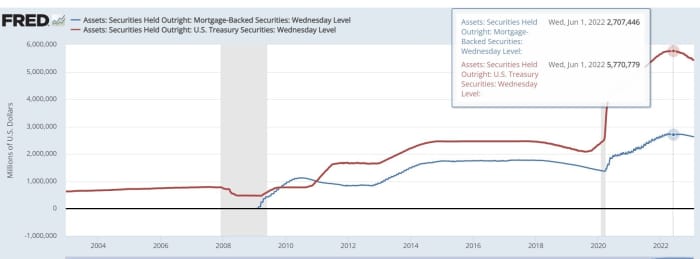The Federal Reserve fired off a smaller interest rate increase on Wednesday, while hinting it might soon be toning down its inflation fight, even before it hardly puts a dent in its pile of mortgage bond holdings.
Thank you for reading this post, don't forget to subscribe!“We have no incentive and no intention to overtighten,” Fed Chairman Jerome Powell said in his news conference after the decision to raise its benchmark rate by 25 basis points, which followed a series of bigger hikes in 2022.
While Powell conceded that the disinflation process has begun, he also said the Fed’s overall battle to keep inflation ticking lower from a 40-year high has yet to be won. “We need to complete the job.”
The problem is that a surge in pandemic housing costs still accounts for a big part of the Fed’s inflation headache.
U.S. home prices went up by some 40% during the pandemic, only recently beginning to retreat nationally after the Fed dramatically raised its policy rate since March. That pushed up longer term bond yields
TMUBMUSD10Y,
and 30-year mortgage rates.
“That just took a sledgehammer to affordability,” said Mike Cudzil, a portfolio manager at bond giant Pimco, which oversees about $1.7 trillion in assets.
Refinancing activity also slowed to a trickle because many existing homeowners already refinanced at fixed rates below 3.5%, Cudzil said, a trend he thinks is unlikely to reverse soon, given the Fed’s promise to keeps rates high for sometime.
At the Fed, the cooling housing market has complicated its plans to passively shrink its mortgage bond holdings at a quicker pace. Investors in mortgage bonds said a quicker exit was unlikely without the central bank taking more drastic measures, like outright sales of its mortgage bonds.
In recent months, the Fed’s Powell has thrown cold water on sales as a possibility for awhile.
Fed caps unmet
In concert with interest rate hikes, the U.S. central bank wants to tighten the screws on financial markets by shrinking its asset holdings.
Its balance sheet rose to a peak pandemic level of nearly $9 trillion after the Fed bought trillions worth of Treasurys and agency mortgage backed securities each month starting in 2020 to prevent a downward spiral in credit markets. In the process, it helped elevate asset prices and bring yields down to historic lows.
Now, it’s taking longer than anticipated to shrink its holdings of mortgage bonds.
Powell on Wednesday said the U.S. economy was in the “early stages” of easing inflation. The Fed now has bumped up its benchmark rate to a 4.5% to 4.75% range, its highest since 2007, from near zero.
Tighter financial conditions haven’t stopped the central bank from hitting its $60 billion monthly cap to shrink its Treasury holdings, which totaled around $5.4 trillion as of late January (see red line). But cutting back on its $2.6 trillion pile of agency mortgage bonds (blue line) has been trickier.

Fed’s balance sheet is declining, mostly because of maturing Treasurys
Federal Reserve data
To kick things off, the Fed in June began letting up to $17.5 billion of its agency mortgage bonds holdings roll off its balance sheet as bonds matured. In September, the central bank boosted its monthly runoff cap to $35 billion.
But by then the housing market already was sputtering. Refinancing activity and new home loan originations froze up as the 30-year fixed rate briefly hit a two decade high of 7% in October, before retreating lately to about 6%.
In recent months, the Fed’s monthly mortgage bond runoff has been coming in around $20 billion, according to BofA Global rates strategist Mark Cabana.
“They are partially to blame for missing their own targets,” said Greg Handler, head of mortgage and consumer credit at Western Asset Management Company, of the Fed’s rapid-fire rate hikes. “But clearly, housing activity is also falling.”
Avoiding what the Fed holds
Like Cudzil at Pimco, Handler said agency mortgage bonds looks attractive in 2023 given expectations for less volatility as the Fed nears its terminal policy interest rate, plus the years of underbuilding that has lead to the U.S. home supply crunch.
Huge equity buffers that most households have built up also should provide a cushion to families and the market from foreclosures, even if home prices drop 10% to 15% and a mild U.S. recession hits, they said.
Meanwhile, returns have been improving for mortgage bond investors to kick off 2023. The ICE BofA US Mortgage Backed Securities index was up 4.2% on the year through Thursday, according to FactSet, while the return on the Bloomberg US Aggregate Government – Agency index was near 1.8%.
The iShares MBS ETF
MBB,
with its agency mortgage focus was up 4.1% for the same stretch, while the Dow Jones Industrial Average
DJIA,
was 2.6% higher and the S&P 500 index
SPX,
was up 8.9%.
Of note, a big part of the Fed’s mortgage holdings are tied to the pandemic boom it helped create. Handler said the central bank’s portfolio was concentrated in mortgages with average rates of about 4%.
“They won’t get anywhere near their $35 billion cap,” Cudzil said.
The Fed helped give homeowners low mortgage rates. Taking them away now makes it harder for it to exit mortgage debt.
